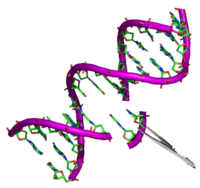
Photo from wikipedia
Detailed classification and characterisation of the gut microbial community and understanding of factors affecting the microbiota are essential to understand the relationship between Chinook salmon (Oncorhynchus tshawytscha) gut microbiota and… Click to show full abstract
Detailed classification and characterisation of the gut microbial community and understanding of factors affecting the microbiota are essential to understand the relationship between Chinook salmon (Oncorhynchus tshawytscha) gut microbiota and fish health. Here we evaluated the multiple effects of biotic and abiotic factors on the gut microbial community composition of farmed Chinook salmon, based on high-throughput sequencing of 16S rRNA gene V1-V3 amplicons. Gastrointestinal microbial community composition was highly dynamic between freshwater and saltwater conditions but similar among individual fish. A high abundance of Proteobacteria and a relatively low abundance of lactic acid bacteria (LAB) were detected in farmed Chinook salmon regardless of salinity. Species richness and diversity were significantly higher in freshwater farmed salmon than in those farmed in the marine environment. Water temperature and farming location displayed relatively minor effects on gut microbiota, while fish age had significant effects on the beta diversity of gut microbiota in both freshwater and saltwater habitats. Our study provided a detailed description of the gut microbial community of farmed Chinook salmon during grow out and contributed to a greater understanding of the effects of fish age and water salinity on the gut microbiota modulation.
Journal Title: Aquaculture
Year Published: 2020
Link to full text (if available)
Share on Social Media: Sign Up to like & get
recommendations!